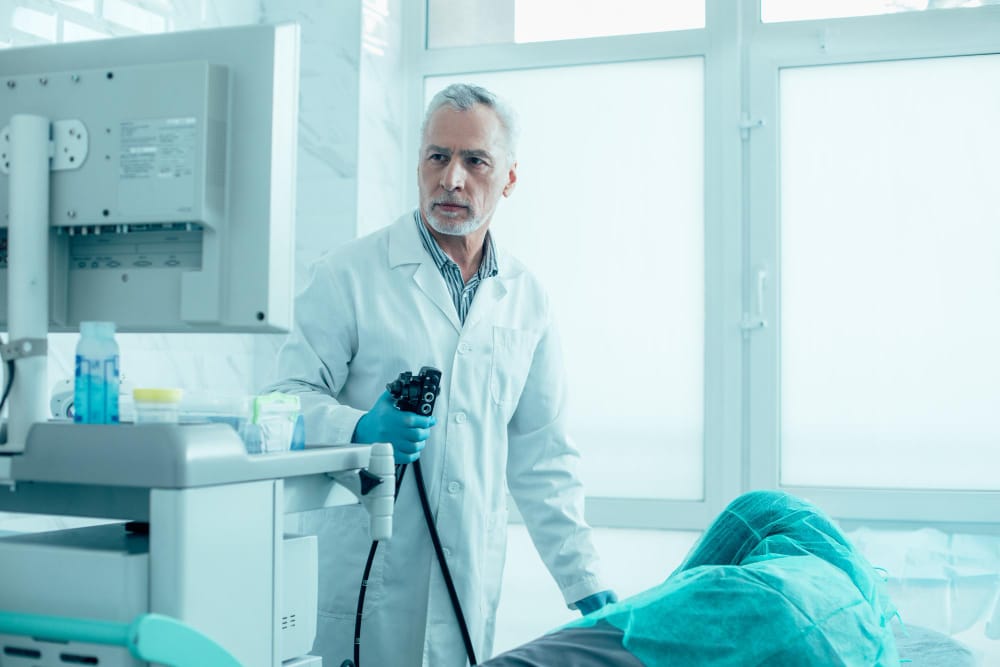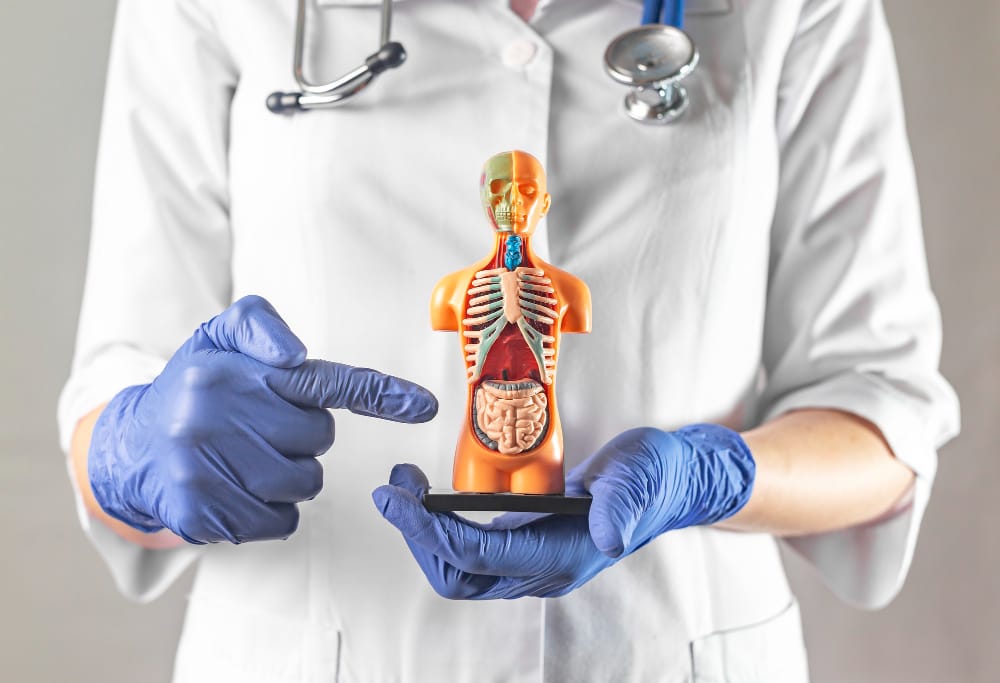Doing a colonoscopy and an upper endoscopy in a single procedure may help to find the cause of your symptoms faster. It has been shown that same-day scheduling of these operations can also reduce health care costs and avoid potential harm from repeated sedation and blood-drawing. There are no rules on which one should go first, or if it needs to be done separately to achieve a better result, it’s still best to talk with your doctor and consider what would work best for you.
A quick recap of a colonoscopy and upper endoscopy
Colonoscopy is a procedure done to check the colon (large intestine) using a specialized instrument that works like a video camera. It will be inserted into the rectum and advanced up into your large intestine until it meets the small intestine.
It will show the lining of the large intestine, and sample tissue may be taken, which could help diagnose and treat early signs of cancer in the colon and rectum, specifically removing these abnormal growths called polyps.
Upper endoscopy or EGD, Gastroscopy is also known as Esophagogastroduodenoscopy, is an examination of the upper gastrointestinal (GI) tract using a specialized instrument that works like a video camera called an endoscope.

This instrument is inserted down the throat and shows images of the lining of the esophagus, stomach, and upper duodenum.
This could help diagnose and treat the causes of upper GI (gastrointestinal) bleeding, swallowing difficulties, the presence of tumors or other abnormalities of the upper GI tract, or even a simple removal of foreign objects.
When is colonoscopy or gastroscopy performed?
Colonoscopy is often advised when you are experiencing the following bowel symptoms:
- Bleeding from your bottom or blood in your stool
- Persistent diarrhea or constipation
- A change in your bowel habits
- Abdominal pain
- Weight loss for no known reason
- A raised temperature, feeling generally unwell, feeling or being sick, and extreme fatigue, in combination with any of the above
Gastroscopy or upper endoscopy is often advised to help rule out certain cancers or to investigate the following symptoms:
- Recurring heartburn
- Difficulty swallowing
- Upper abdominal pain
- Frequent vomiting
- Recurring indigestion
Risks of endoscopy
Most medical procedures, especially those involving major surgery, do have risks due to the nature of these operations, the reaction of the patients’ body while the procedure is ongoing, and the result of the operation to the body after it is done.
Bleeding and puncture of the colon (perforation) are possible complications of colonoscopy, while bleeding and perforation (hole) of the stomach, duodenum, esophagus, or at the biopsy site are possible complications of an upper endoscopy.
Some patients may react the sedatives, but these complications are uncommon.
Prepararing for the two procedures
For the endoscopy to be successful, we must have clear views of your bowel, and if your bowel is not clear, the test may have to be repeated. With your appointment details, you will be given detailed instructions on clearing your bowel.

You may be given a low residue diet sheet to follow for a few days before starting the bowel preparation. It will also usually include using laxatives if you have a colonoscopy; the type of laxative depends on which test you are having.
You will be asked a few important questions, like if you have a known allergy or reaction to sedatives and anesthetics, please let the endoscopist or your nurse know. You may continue to take your usual medication up to the day of your test, but you must stop taking certain tablets at least five days before your test.
These include all iron tablets and medication used for the treatment of diarrhea. It is also important that you inform your healthcare provider if there is a possibility that you may be pregnant. Any information you share with them should be kept strictly confidential.
If you are diabetic, please call your primary care provider and ask how you should manage your diabetes medications. If you are taking blood thinners, call the prescribing doctor and ask what you should do.
These medications include but is not limited to:
- Warfarin (Coumadin)
- Rivaroxaban (Xarelto)
- Apixabin (Elequis)
- Dabigatran (Pradaxa)
- Edoxabon (Savaysa)
- Dipyridamole (Aggrenox)
- Clopidogrel (Plavix)
- Prasugrel (Effient)
- Ticagrelot (Brillinta)
- Heparin
- Enoxaparin (Lovenox)
- Fondaparinux (Arixtra)
Do not stop taking your blood-thinning medicine without first talking to your doctor.
A day before your procedures:
- Do not eat any solid food; no breakfast, lunch, or dinner.
- Stop any antacids: TUMS, Rolaids, milk of magnesia, sucralfate, Carafate, or any stomach coating products.
- Start a clear liquid diet as soon as you wake up in the morning. You may drink apple juice, white grape juice, Kool-Aid, sports drinks, water, tea, clear soda, clear chicken or beef broth, popsicles, hard candy, Jell-O. Please avoid any liquids that are red or purple.
- You may not have coffee, milk, yogurt, ice cream, dark-colored soda, chocolate, or alcohol.
- Mix laxative sachets and turn them into a drink. Full instructions on how to use these will be enclosed. If you need to give the enema to yourself prior to coming for the sigmoidoscopy, full instructions will be provided.
On the day of your procedures:
- Do not eat anything solid, suck on hard candy or chew gum.
- Drink only clear liquids and/or laxative solution.
- You may take your morning medications with small sips of water.
- 5 hours before your procedure begin drinking the remaining portion of your laxative solution (8oz every 15 minutes). The goal is to make your stool a clear liquid, similar to the consistency and color of urine.
- Drink all of the laxative solutions, even if your output is clear. If after you complete the prep your stool is not clear liquid or the color of urine, please call your doctor.
- Do not drink anything else after this. After you finish the bowel prep, no food or drink is permitted until after your procedure.
- If you do not follow these instructions, your colon may not be cleaned out well enough for your doctor to clearly see the inside of your colon. Your colonoscopy may then need to be rescheduled.
What happens during the combined procedure?
During this procedure, your doctor will look for anything concerning, possibly performing a biopsy (taking a small amount of tissue to examine for infections or abnormalities) or removing a polyp if necessary.
Both procedures combined usually take between 30 and 60 minutes. It commonly involves giving sedation, a combination of drugs, making you relaxed and providing pain relief.
To do this, a needle is inserted in a vein in your hand or arm. This is removed once the examination is finished and you have recovered from the sedation. If you have opted for Entonox, the nurse will explain how to use it.
Your endoscopist and nurse will discuss the examination with you and answer any questions you or a family member has. You will then be asked to read and sign the consent form.
At any point during the procedure, you can withdraw your consent and ask for the procedure to stop. If this happens, the endoscopist will stop the test and take the scope out.
What to expect after the operation?
If you were given a sedative, you must have someone to collect you and stay with you at home for at least 24 hours until you are fully recovered.
You must not drive, drink alcohol, operate machinery (including all kitchen appliances), or sign important documents for 24 hours following the sedative. While complications are rare, in exceptional cases, a patient may have an allergic reaction to the sedative, causing trouble breathing and irregular heart rhythms.
Serious sedation reactions are usually more common in patients with severe heart or chest conditions, although these are rare.
FAQs
How long is the combined colonoscopy and endoscopy procedure?
The whole combined procedure itself usually takes 45 to 60 minutes, although you should plan on two to three hours for waiting, preparation and recovery.
How long will I recover from the operation?
Recovery from a colonoscopy usually lasts about a day. To help with healing, be sure to follow any post-procedure instructions. This may include resting, drinking lots of fluids, and not drinking alcohol for the first 24 hours.
Most patients can eat immediately after endoscopy without problems. You may have a sore throat for 1-2 days, but this should resolve.
Can I still undergo a colonoscopy if I am on my period?
Yes, the procedure can still be performed while you have your period. Tampons can be worn if preferred by the patient.
Conclusion
Going through any medical procedure could make you feel anxious and scared. There are so many aspects to consider, including the risks, the costs, the physical pain, and not to mention the mental stress it would cause before and even after the operation.
We suggest that you ask as many questions as possible to your doctor because once you have a better and broader understanding of what is happening to your body, it would not be as scary in your head.
We hope that this article helped you understand colonoscopy and endoscopy better. Do not hesitate to consult your doctor or your local healthcare provider if in doubt.


